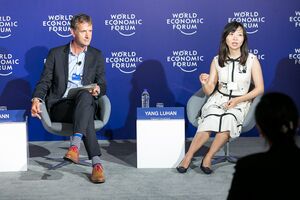Luhan Yang
(scientist, businesswoman) | |
|---|---|
 Yang with Oliver Cann from the World Economic Forum during the panel Editing Humans | |
| Nationality | Chinese, US? |
| Alma mater | Peking University, Harvard Medical School |
| Member of | WEF/Young Global Leaders/2017 |
| Interests | • xenotransplantation • transhumanism |
Scientist working on xenotransplantation, cross-species transplants. Berggruen Institute. World Economic Forum Young Leader. | |
Dr. Luhan Yang is the co-founder and chief scientific officer at eGenesis and later of Qihan Biotech, companies working to make xenotransplantation succeed, a medical procedure trying to engineer animal (especially pig) cells, tissues and organs for human transplantation.[1]
She sits on the Transformations of the Human Advisory Board at the Berggruen Institute[2]. She was selected Young Global Leader by the World Economic Forum in 2017.[3]
Early Life
Yang grew up in Sichuan province. She holds BS degrees in biology and psychology from Peking University, and moved to Harvard Medical School for her PhD in human biology and translational medicine in 2008.[4]
Together with her Harvard mentor, Professor of Genetics George Church, she founded eGenesis in 2015, that quickly raised $38 million to advance its research and development work. Church and Yang had in 2012 pioneered the breakthrough use of CRISPR to edit the genome of human cells.[5]
Xenotransplantation
The companies use CRISPR gene-editing technology to modify pig organs for use in human transplants, a process known as xenotransplantation. The concept is still experimental, and has two main problems. One is that there are endogenous retroviruses in the pig genome — some virus sequences — that can jump around within the pig genome. The viruses can also jump from the pig cell to the human cell, a potential cross-species transmission. Yang says this is a huge safety and regulatory concern. The second hurdle of using pig organs for human transplant is a tremendous issue of rejection.[6]
In 2018, the highly contagious viral disease called African swine fever (ASF) spread to China. It wiped out the country’s pig population of several hundred million and, with it, the animals she needed to conduct her xenotransplantation experiments. The ASF virus disrupted the whole chain and the company largely had to pivot its research focus for a while.[7]
The other main research area is to modify cells for use in cancer immunotherapy, where the main problem is rejection. Because the cells are derived from a donor, it’s likely the patient’s immune system will attempt to destroy the cells. To prevent rejection, the company perform genome modifications on donor stem cells to reduce the recipient’s immune response.[8]
Event Participated in
| Event | Start | End | Location(s) |
|---|---|---|---|
| WEF/Annual Meeting/2019 | 22 January 2019 | 25 January 2019 | Switzerland World Economic Forum |
References
- ↑ https://www.ted.com/speakers/luhan_yang
- ↑ https://www.berggruen.org/people/luhan-yang/
- ↑ https://www.weforum.org/people/luhan-yang
- ↑ https://www.nature.com/articles/d41586-021-02732-y
- ↑ https://news.harvard.edu/gazette/story/2018/05/pig-organs-for-human-patients-a-challenge-fit-for-crispr/
- ↑ https://www.sciencenews.org/article/sn-10-scientists-to-watch-alumni-2021#yang
- ↑ https://www.nature.com/articles/d41586-021-02732-y
- ↑ https://www.nature.com/articles/d41586-021-02732-y